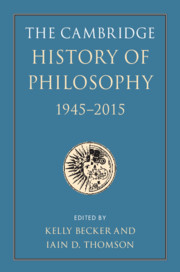The Cambridge History of Philosophy, 1945–2015
Langue : Anglais
Coordonnateurs : Becker Kelly, Thomson Iain D.

Leading experts from the diverse fields of philosophy explain and illuminate the most important philosophical developments since World War II.
This landmark achievement in philosophical scholarship brings together leading experts from the diverse traditions of Western philosophy in a common quest to illuminate and explain the most important philosophical developments since the Second World War. Focusing particularly (but not exclusively) on those insights and movements that most profoundly shaped the English-speaking philosophical world, this volume bridges the traditional divide between 'analytic' and 'Continental' philosophy while also reaching beyond it. The result is an authoritative guide to the most important advances and transformations that shaped philosophy during this tumultuous and fascinating period of history, developments that continue to shape the field today. It will be of interest to students and scholars of contemporary philosophy of all levels and will prove indispensable for any serious philosophical collection.
Introduction. Philosophical reflections on the recent history of philosophy; Part I. Analytic Philosophy: Section 1. Language, Mind, Epistemology: 1. Analytic philosophy of language: from first philosophy to foundations of linguistic science; 2. Analyticity: the Carnap-Quine debate and its aftermath; 3. Philosophy of linguistics; 4. Varieties of externalism, linguistic and mental; 5. An analytic-hermeneutic history of consciousness; 6. Computational philosophies of mind; 7. Philosophy of action; 8. Contemporary responses to radical scepticism; 9. Post-Gettier epistemology; Section 2. Logic, Metaphysics, Science: 10. Logic in the second half of the twentieth century; 11. (Re)discovering ground; 12. Lewis' theories of causation and their influence; 13. Naturalism from the mid-twentieth century to the present: Quine's 'Hegelianism', Armstrong's empiricism, and the rise of liberal naturalism; 14. The history of philosophy of science; 15. A modern synthesis of philosophy and biology; Section 3. Analytic Moral, Social, and Political Philosophy: 16. The revival of virtue ethics; 17. Kantian ethics; 18. Consequentialism and its critics; 19. The rediscovery of metanormativity: from Prichard to Raz by way of Falk; 20. Constitutivism; 21. John Rawls's political liberalism; 22. The twilight of the liberal social contract: on the reception of Rawlsian political liberalism; 23. Feminist philosophy and real politics: Susan Moller Okin on 'multiculturalism'; Section 4. Analytic Aesthetics and Philosophy of Religion: 24. Analytic aesthetics and philosophy of art; 25. Philosophy of religion; Part II. Continental Philosophy: Section 5. Central Movements and Issues: 26. Existentialism; 27. Sartre and Merleau-Ponty on freedom; 28. Heidegger, critical theory, and the critique of technology; 29. Authenticity and social critique; 30. Hermeneutics in post-war Continental European philosophy; 31. Feminist philosophy since 1945: the evolution of feminist materialism; 32. Philosophies of difference; Section 6. Continental Moral, Social, and Political Philosophy: 33. The concept of autonomy in the history of the Frankfurt School; 34. Emerging ethics; 35. Leo Strauss: political philosophy as first philosophy; 36. Critical environmental philosophy; 37. Philosophy of technology; 38. Philosophy of education and the 'education of reason': post-foundational approaches through Dewey, Wittgenstein, and Foucault; Section 7. Continental Aesthetics and Philosophy of Religion: 39. The bearing of film on philosophy; 40. Aesthetics, psychoanalysis, and the avant-garde; 41. Continental philosophy of religion; Part III. Bridge Builders, Border Crossers, Synthesizers, and Comparative Philosophy: Section 8. Bridge Builders, Border Crossers, Synthesizers: 42. Rethinking the analytic/Continental divide; 43. Phenomenology and ordinary language philosophy; 44. Phenomenology meets philosophy of mind and language; 45. The impact of pragmatism; 46. Unruly readers, unruly words: Wittgenstein and language; 47. Anglo-American existential phenomenology; 48. A conceptual genealogy of the Pittsburgh School: between Kant and Hegel; Section 9. Comparative Philosophy: 49. Authenticity and the right to philosophy: on Latin American philosophy's great debate; 50. The East in the West: Chinese, Japanese, and Indian philosophy in the twentieth century; 51. Jewish philosophy and the Shoah Claire Katz; Part IV. Epilogue: On the Philosophy of the History of Philosophy: 52. Developments and debates in the historiography of philosophy.
Kelly Becker is Professor of Philosophy at the University of New Mexico. He is the author of Epistemology Modalized (2007) and a co-editor of The Sensitivity Principle in Epistemology (with Tim Black, Cambridge, 2012).
Iain D. Thomson is Professor of Philosophy at the University of New Mexico. He is the author of Heidegger on Ontotheology (Cambridge, 2005) and Heidegger, Art, and Postmodernity (Cambridge, 2011).
Iain D. Thomson is Professor of Philosophy at the University of New Mexico. He is the author of Heidegger on Ontotheology (Cambridge, 2005) and Heidegger, Art, and Postmodernity (Cambridge, 2011).
Date de parution : 11-2019
Ouvrage de 902 p.
15.8x23.5 cm
Disponible chez l'éditeur (délai d'approvisionnement : 14 jours).
Prix indicatif 175,79 €
Ajouter au panierThème de The Cambridge History of Philosophy, 1945–2015 :
© 2024 LAVOISIER S.A.S.



